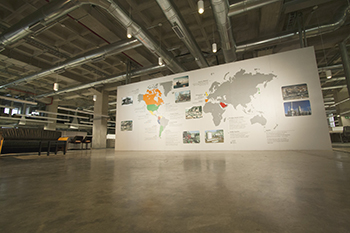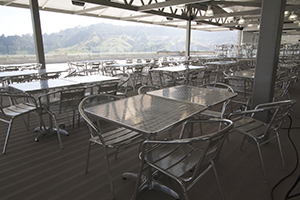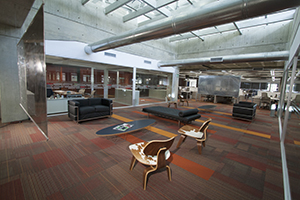 CARACAS, Venezuela — Paving the way for a movement of high-performing, sustainable buildings, the headquarters of energy engineering firm Vepica has achieved the first LEED certification in Venezuela. The five-story, 82,000-square-foot building was recently awarded LEED Silver certification and boasts the nation’s largest solar panel installation.
CARACAS, Venezuela — Paving the way for a movement of high-performing, sustainable buildings, the headquarters of energy engineering firm Vepica has achieved the first LEED certification in Venezuela. The five-story, 82,000-square-foot building was recently awarded LEED Silver certification and boasts the nation’s largest solar panel installation.
The building includes several green features such as 195 solar panels totaling 50 kWh of installed capacity, enhanced energy performance, public transportation access, 80-person water use reduction, innovative wastewater technologies, building and material reuse, and advanced construction waste management. Though the project team decided to aim for LEED certification from the onset of the project, the process of gaining certification took a great deal of education.
“The decision to pursue LEED certification came before the project started its initial design phase. It was made by the company’s board of directors in an attempt to break the mold regarding the building construction sector in Venezuela,” said Carlos Candiales, vice president of alternative energy at Vepica. “The myth that surrounds green and sustainable building in the country was a great obstacle to overcome, especially during the construction process. But the idea was to show everyone in the country that it is just a myth, and that designing and building responsibly is not impossible in the country as many believed.”
 Along with educating the public, the project required much self-education as the owner, contractors, designers and chain of suppliers had little experience with sustainable buildings. Many project obstacles were regarding construction materials, best practices and efficient design, Candiales said, however, the greatest overall challenge was in learning to adapt designs and construction processes to foreign standards not commonly used in Venezuela.
Along with educating the public, the project required much self-education as the owner, contractors, designers and chain of suppliers had little experience with sustainable buildings. Many project obstacles were regarding construction materials, best practices and efficient design, Candiales said, however, the greatest overall challenge was in learning to adapt designs and construction processes to foreign standards not commonly used in Venezuela.
“Our LEED certification management team had to put in a lot of effort in order to maintain impeccable construction conditions, to find the right materials for the job, to find the most viable design solutions that would fit our specific geographical conditions, for which there was no data or case studies available, and to make the most of whatever resources we could find available around us,” Candiales said.
The Vepica headquarters building performed particularly well in the water efficiency category. The project attained 10 out of 10 credits using innovative water conservation strategies and achieved 80 percent water reduction use.
“This project excelled in water usage through different strategies,” Candiales said. “First of all, a great effort was made in order to secure the best and most efficient fixtures that we could find available. All the consumption rates of all the types of fixtures are well below the required minimum.”
Approximately 90 percent of all landscaped areas, which is primarily composed of local vegetation, require almost zero water. The project also features a rainwater collection tank.
“Taking advantage of a very significant area of rainwater collection surface on the roof, the building uses rainwater to flush all fixtures inside the project,” Candiales said.
 As the first LEED-certified project in Venezuela, the project will surely begin a movement toward high-performance design and construction in the country. Candiales believes the project will also encourage other projects in Venezuela and has witnessed an increased interest in LEED certification.
As the first LEED-certified project in Venezuela, the project will surely begin a movement toward high-performance design and construction in the country. Candiales believes the project will also encourage other projects in Venezuela and has witnessed an increased interest in LEED certification.
“Not only do we believe it, we know it,” he said. “We are currently developing the design phase of LEED certification for a new construction and major renovations project right here in Caracas for a major pharmaceutical firm’s headquarters, and have been called by other leading private and state-owned companies that have shown a lot of interest in our project and are looking to certify a project of their own.”

